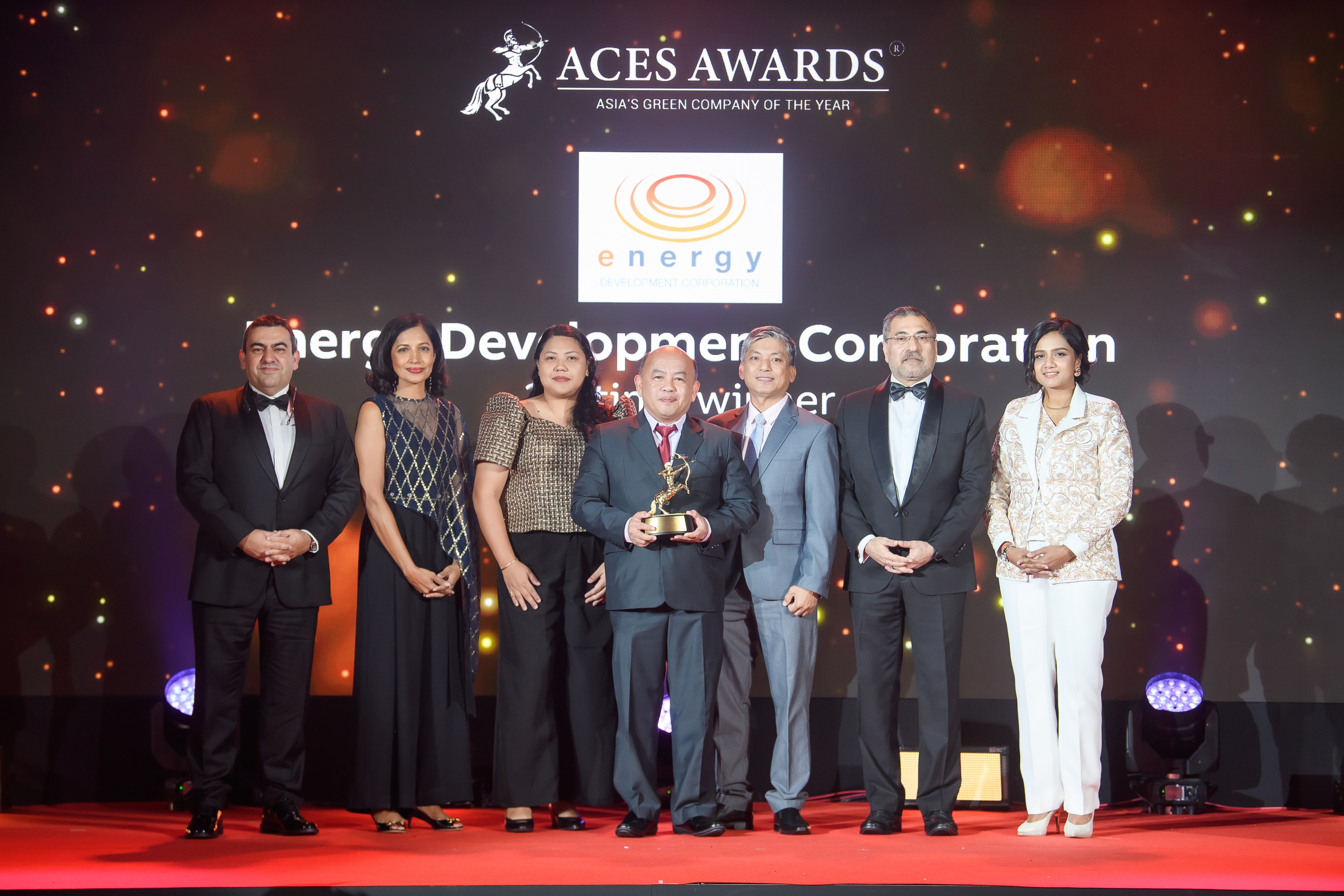Energy
Development
Corporation
was
proudly
honoured
as
Asia’s
Green
Company
of
the
Year
at
the
ACES
Awards
2024.
Representing
EDC
on
stage
were
Abegail
Gatdula,
Watershed
Management
Officer
(left
center),
Erwin
Magallanes,
Head
of
Corporate
Relations
(center),
and
Danilo
Tolarba,
AVP
&
Human
Resource
Head
(right
center).
The
award
was
presented
by
Luis
Bueno
Nieto,
Advisor,
ACES
Council
(left),
Dr
Jayanthi
Desan,
Advisor,
ACES
Council
(2nd
from
left),
Dr
Shanggari
Balakrishnan,
President,
ACES
Awards
(right),
and
Hemant
Batra,
Honorary
Chairman,
ACES
Council
(2nd
from
right).
This
recognition
cements
EDC’s
leadership
in
sustainability
and
green
innovation
across
Asia.
As
the
largest
renewable
energy
producer
in
the
Philippines,
EDC
is
at
the
forefront
of
clean
energy
transformation.
Central
to
its
sustainability
efforts
is
its
BINHI
programme,
launched
in
2008
to
propagate
endangered
native
tree
species,
rehabilitate
degraded
forests,
and
protect
biodiversity.
This
flagship
initiative
embodies
EDC’s
long-term
vision
for
ecological
restoration
and
sustainable
development.
Empowering Communities through Partnerships
EDC’s success stems from its strategic collaborations with local communities, farmers, and organisations. Working with 88 local farmer associations, EDC provides resources and training to manage nurseries, source seedlings, and protect forested areas near its geothermal plants.
One notable initiative is the Baslay Coffee Program in Negros Oriental, which supports former slash-and-burn farmers through sustainable agroforestry. By transitioning to eco-conscious coffee farming, these communities have gained stable livelihoods while safeguarding the environment. Similar programmes in Leyte and North Cotabato replicate this model, demonstrating EDC’s scalable approach to community engagement.
Global partnerships, including collaborations with the University of the Philippines Institute of Biology and BGCI’s Global Tree Assessment Program, further enhance BINHI’s impact on biodiversity conservation.
Leading in Regenerative Development
EDC’s sustainability philosophy extends beyond preservation to regenerative development. By restoring ecosystems and ensuring a net-positive environmental impact, EDC sets a benchmark for sustainable business practices. Its renewable energy portfolio—spanning geothermal, hydro, wind, and solar—plays a vital role in decarbonising the Philippines’ energy grid, avoiding nearly 6 million tonnes of CO₂ emissions annually. EDC’s geothermal plants, delivering 24/7 clean energy, are instrumental in reducing fossil fuel reliance.
Complementing its clean energy efforts, EDC’s watershed management programmes sequester more carbon than the company emits. In 2023, EDC’s forested areas absorbed 1.7 million tonnes of CO₂, surpassing its operational emissions of 1.1 million tonnes.
A Vision for a Regenerative Future
Looking ahead, EDC aims to expand its low-carbon energy portfolio to 9,000 MW by 2030, further reducing emissions and restoring ecosystems through BINHI and other initiatives. This vision reinforces EDC’s role in driving the Philippines’ transition to a regenerative, decarbonised future.
The ACES Green Company of the Year Award reflects EDC’s leadership in renewable energy and environmental regeneration. Shanggari B, President of the ACES Awards, states, “EDC’s vision of a regenerative future exemplifies how businesses can thrive while making a profound, positive impact on the planet.”
![]() https://www.energy.com.ph/
https://www.energy.com.ph/
Hashtag: #EDC #EnergyDevelopmentCorporation #Philippines #Sustainability #GreenEnergy #ACESAwards2024 #ResponsibleBusiness #SustainableFuture
The issuer is solely responsible for the content of this announcement.
Support InfoStride News' Credible Journalism: Only credible journalism can guarantee a fair, accountable and transparent society, including democracy and government. It involves a lot of efforts and money. We need your support. Click here to Donate
